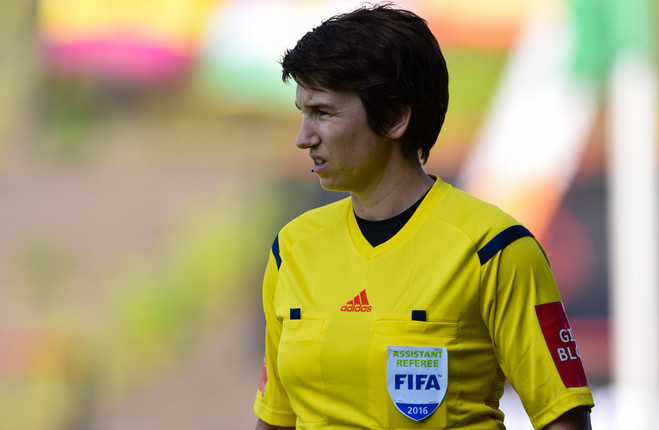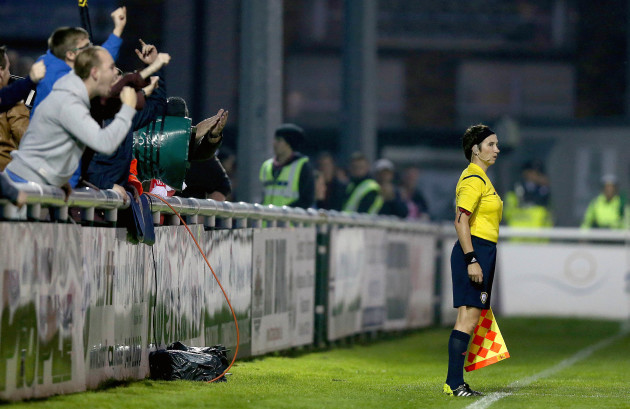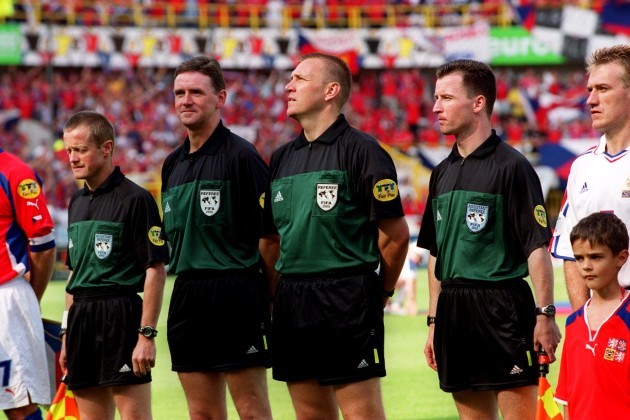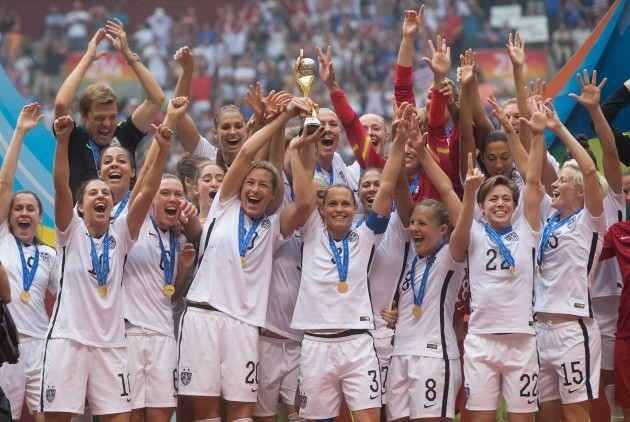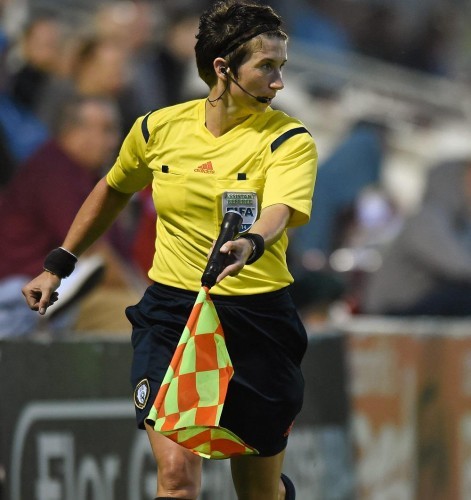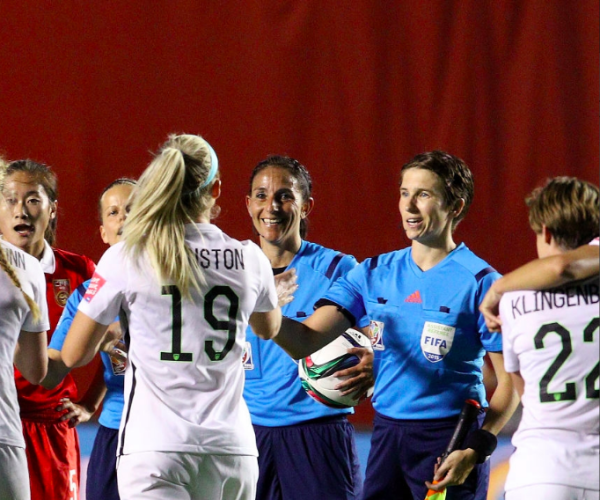IT’S JULY 2016 and after almost a decade of committed hard work and consistent, high-level performances at the very top of her profession, Michelle O’Neill has been selected to travel with an Irish contingent of referees to officiate a Europa League qualifying game in Eastern Europe.
In a career full of impressive achievements which include becoming just the second ever Irish referee to officiate at a World Cup, the first ever Irish woman to do so, and the only Irish person to ever referee a World Cup final at any level, this game in Tallinn still holds a special place in the 40-year-old’s collective memory.
Neil Doyle takes charge of the game on the pitch, with Allen Lynch and O’Neill his two assistants running the line. Hosts Levadia Tallinn prevail 3-1 during the opening leg of the second qualifying round encounter in the Estonian capital, but the affair would prove to be a memorable, quite unforgettable first taste of football at that level for the Wexford native.
“Aw, that was an amazing experience,” O’Neill smiles, recalling the game. “That was such a buzz. It was an honour to be selected as an assistant referee to go out on a men’s trio. You’re part of an Irish team going out on a men’s Europa League match and you’re going, ‘Wow. I must be doing something right’”.
The game didn’t pass by without one or two dramatic incidents. O’Neill was forced to rule out a goal for Levadia in front of an intense home crowd full of screaming, passionate supporters. Replays of the incident would show she got the decision completely right, but some players took exception in the heat of the moment.
“When you go out there… to be honest, they weren’t expecting a female referee,” she recalls. “They were like: ‘right, hello, Michael!’ And I was like: ‘no, my name’s Michelle’. So then they went: ‘right… so we have a female official?’ After that they apologised and we got on with the game.
“After something like that happens at the start, I know for a fact that I’m going to have to perform to a super level. On the night I actually had a hairline goal decision and was correct. Everyone was reacting like: ‘Wow Michelle, you’re actually good’. And I was like ‘Really? Well thanks’, she laughs.
The fans were all there with their shirts off, screaming and shouting. I was just delighted that I was positioned in front of the away section and the goal-line decision was in the away fans’ favour — they all loved me because of it. Players will chase after you if they think you got the incorrect decision.
“Maybe it was a bit more hyped because I was a female. But again, I had a really strong referee with me in Neil Doyle and he came straight over, cut them off and gave them their yellow cards for dissent. That’s how you deal with it, you know?
“At the end of the day we’re all match officials, we’re all here to do a job. My team accepts me and respects me. But you do feel like you have to prove yourself to the world all the time. That has to change.”
We are speaking just a few hours before O’Neill travels to Dublin Airport in the early hours of Wednesday morning and flies out to Paris, where she is one of just 47 assistant referees across seven continents selected to take part in this summer’s Fifa Women’s World Cup in France — which begins on Friday when the hosts face South Korea at PSG’s Parc des Princes.
Congratulations to Michelle O'Neill, who will officiate in her second game @UEFAWomensEURO on Tuesday
— FAIreland ⚽️🇮🇪 (@FAIreland) July 24, 2017
⬆ Forward progress for Irish referees pic.twitter.com/TPL2yDGjBk
It’s the highest honour any referee can receive, to be called upon to officiate at a World Cup. Not that it’s an entirely new experience for Michelle O’Neill, of course.
Four years ago in Canada she made her debut at the competition, becoming the first Irish woman in history to referee at a World Cup and just the second Irish person ever to do so — following in the footsteps of her mentor, Eddie Foley, who featured at the men’s World Cup back in 1998.
O’Neill’s refereeing career began a little more than a decade ago, after she hung up her playing boots following a successful career with Adamstown in the local Wexford League as a self-described “nippy striker”, a very vocal one at that, who always wanted to be top goalscorer.
In 2008 she decided to give officiating a try and soon afterwards received a call from the FAI’s School of Excellence.
She has gone from strength to strength ever since and is now a regular fixture at SSE Airtricity League, Women’s National League and international games, as well as FAI Cup finals at the Aviva Stadium almost every November too. A referee who has risen through the ranks over the last 10 years and is now undoubtedly at the top of her profession.
But it’s away from the pitch where she derives the most rewarding experience in her day-job as a swimming instructor, particularly her weekly sessions with children at the Lady of Fatima School in Carrigeen, which is fully special needs.
“I’m a swimming teacher and would work in a pool for five to six hours per day,” she explains. “I normally have two days off during the week. It’s very, very intense. I do back-to-back swimming lessons so that I can have the rest of the day off for refereeing training sessions, because I would train six days a week.
“Being a swimming instructor is the most rewarding job you could ever do in your whole lifetime. To see the progression of these kids at the Lady of Fatima, to get them from being so scared of the water and get them to love swimming is such a huge reward.
“I don’t see anyone’s disability. I can only pick out the person’s ability. I will work on their strengths to a point where they are actually laughing and wanting to come in and listen to me from one week to another. You do need to develop a huge, huge trust with the kids.”
O’Neill casts her mind back to four years ago in Canada, where she made her World Cup debut, recalling those moments of complete euphoria when she was chosen to officiate a crucial quarter-final between the USA and China in front of more than 65,000 supporters and a global TV audience of millions across the world.
Packed from pillar to post with star names, icons and trailblazers of women’s football in the last decade like Carli Lloyd, Hope Solo, Megan Rapinoe, Alex Morgan and Abby Wambach, the US would win the encounter 1-0, go on the clinch the World Cup and establish themselves as one of the great modern sides in the game — they are overwhelming favourites to retain their crown in France this month.
When they say ‘dreams come true’ and you have those spine-tingling experiences… that was it. That was the ultimate,” O’Neill says remembering the 2015 World Cup. “The memory that sticks out in my mind is when I was standing in Ottawa before that quarter-final.
“I had the USA on one side of me and had China on the other. You’re standing in the middle going… ‘there’s 65,000 spectators… there’s millions of people watching around the world on TV — am I really here? Is this really happening?
“You’ve Carli Lloyd, the US captain, and you’re standing next to her knowing that these players are such role models for kids nowadays growing up. But you do realise that you’re there and that you’ve a job to do, that you need to concentrate and focus. You get into the game, get into the stride and the match is over in what feels like 10 minutes. I mean, a 90 minute match actually feels like 10 minutes, basically.
“Then you come in and you’re thinking, ‘Wow, yeah, I want more of this.’ I absolutely loved the experience. I never wanted it to end and just made the decision to get fitter, faster, stronger and better so I could have the chance to do it again at another World Cup in 2019.”
We don’t often get to hear from referees, or hear their stories. So often people’s experiences with officials is framed in a negative light, criticising a decision from the stand, complaining about a call during a game, or even witnessing officials receive abuse from fans inside stadiums.
O’Neill has spoken before about how it’s only natural for new referees to receive a bit of stick, both from players and supporters, because they are the new kid on the block. But once you prove that you are capable at the job, communicate that you’re only here to do that job, and stress that without officials making the hard calls, there would be no game in the first place, then it all becomes a bit easier.
There are a couple of days where you’re standing there in the middle of the lashing, pouring rain and the crowd are on your back shouting absolute abuse at you and you’re going: ‘Why am I here? What am I doing this for?’,” she sighs.
“I mean, if a referee hasn’t questioned themselves at least once in their career, then they’re not human. You will question yourself, saying: ‘Why am I doing this?’ But then you remember the big moments of your career. You remember getting the correct decision and it being highlighted.
“You remember the biggest moments of your career and then you’re like ‘Yeah, I do it for that. I do it for the love of the game’. I love, love, love the game. I love football. So, that’s why I’m here. You just refocus and you re-concentrate. Sure, there is a lot of negativity out there, but do you know what? There is also a lot of positive stuff out there with refereeing and we really have to start highlighting that more.”
Look who I met on the flight home from the #U20WWC Final proudly displaying her gold medal 🥇👏🏻🇮🇪@FAIWomen @FAI_WNL @FIFAWWC pic.twitter.com/bLVP37tWCd
— Sue Ronan (@sueronan) August 25, 2018
One of these extra special moments came three years ago in Papua New Guinea. O’Neill was called upon to officiate at the U20 Women’s World Cup and was chosen to referee the final between North Korea and France. The significance? She became the first Irish person in history to referee any World Cup final. One for the history books for sure.
“I was the first ever Irish official to be in a World Cup final, yeah,” she confirms, smiling. “That was a huge, huge, huge moment for my career in terms of thinking ‘Yeah, it actually can be done, you can get to a World Cup final’. I remember that tournament being so successful every day for me.
To reach the final, it was — I’ve no words to describe it. Then you receive your gold medal at the final whistle — it’s the same as a player’s. Players get their World Cup medal for working hard and getting to their final. We work just as hard to be there, as well. It was amazing.”
O’Neill exudes positivity and stresses the importance of focussing on the positive side of refereeing, so that younger boys and girls, and even players too, will consider going into the profession in order to experience some of the incredible highs she has enjoyed over the last decade.
So often it is the players, managers and coaches who are hailed for their genius, their skill, dedication and hard work and more often than not it is the referees who are overlooked, repeatedly criticised and not given their due for a profession which offers very few thanks in reward. It all comes down to a pure love of the game, O’Neill attests.
“When I became an official first everyone was like ‘Oh, are you in the wrong field, this is a men’s match?’ And you’re kind of looking at them going, ‘Yep, are you in the right field? Do you want to play football today?’ So I’m there going: ‘Right, so. You go play football and I’ll referee the game as best as I can’. And that is my attitude.
“I just want players to look at me as a match official. You know, take the gender out of it and let’s see how we get on. From an early stage that’s what I had to do. And if I heard anything, especially from players, I knew that I could deal with players.
“You can deal with them through discipline. And at the end of the day, if someone wants their match to be refereed, well just go and play your soccer and I will try and protect you — the players — and use the laws of the game to the best of my knowledge.”
Preparing for her second successive World Cup, back-to-back tournaments, she is giddy with excitement at the prospect of flying to Paris, undertaking a gruelling week of training before the games get underway this Friday at the Parc des Princes when France meet South Korea.
It is only now that she can actually dwell on how far she has come, from enjoying a career as a striker with Adamstown to becoming one of the most accomplished and respected assistant referees in Ireland, and now highlighted for her consistently high performances on a world stage too.
I never even thought of any of that until recently when all the interviews are coming in and you’re actually being highlighted and you’re standing back a bit,” she reflects. “But it’s just every day I want to achieve it, every day I want to push myself. I want to be the best, I want to just get to the top. And when you’re there, when you’re at the top, you want to stay there and be there as long as possible.
“I mean, when I achieved going to a World Cup for the first time in 2015 I was like ‘Right, Eddie Foley, thanks very much.’ Because he was the first male referee to ever do it in Ireland during the 1998 men’s World Cup and now I’m the first female to do it in Ireland. He was my mentor coming up through the ranks and it was amazing to get his insight and his training behind me.
“So then it was like ‘Right, now it’s time to go further and to get back-to-back’ and to keep pushing the limits of female officials in Ireland and to set a standard and an opening for others coming up. I want to show them that this is okay to do, let’s just go and do it.”
Undoubtedly a role model in women’s sport, she encourages any young person to consider a career in the officiating side of things. So often the glory is bestowed upon players and managers.
But when it’s an internal love of the game which drives you — not seeking the individual glory and headlines — then there is just as much to do, and see, and experience with a flag by your side and a whistle in your hand as there is with a ball at your feet. Even if you have to suffer constant criticism when all you’re trying to do is your best.
Let’s have a referee from Ireland be a role model for people,” O’Neill says. “There are other outlets that allow someone to be a super strong woman in sport, and I think it’s great if players that are finished playing jump over and become officials. I think there’s a huge opportunity there.
“Definitely never give up on your dreams and just work super hard,” is Michelle O’Neill’s parting advice as she heads off to finish packing her bags for Paris. “Don’t listen to all that negativity and criticism out there because it will actually make you stronger.
“Just focus and work hard and want to be where you want to be — that’s with everything in life, not just in officiating. My advice? Just dream big and go for it.”
Subscribe to our new podcast, The42 Rugby Weekly, here:
